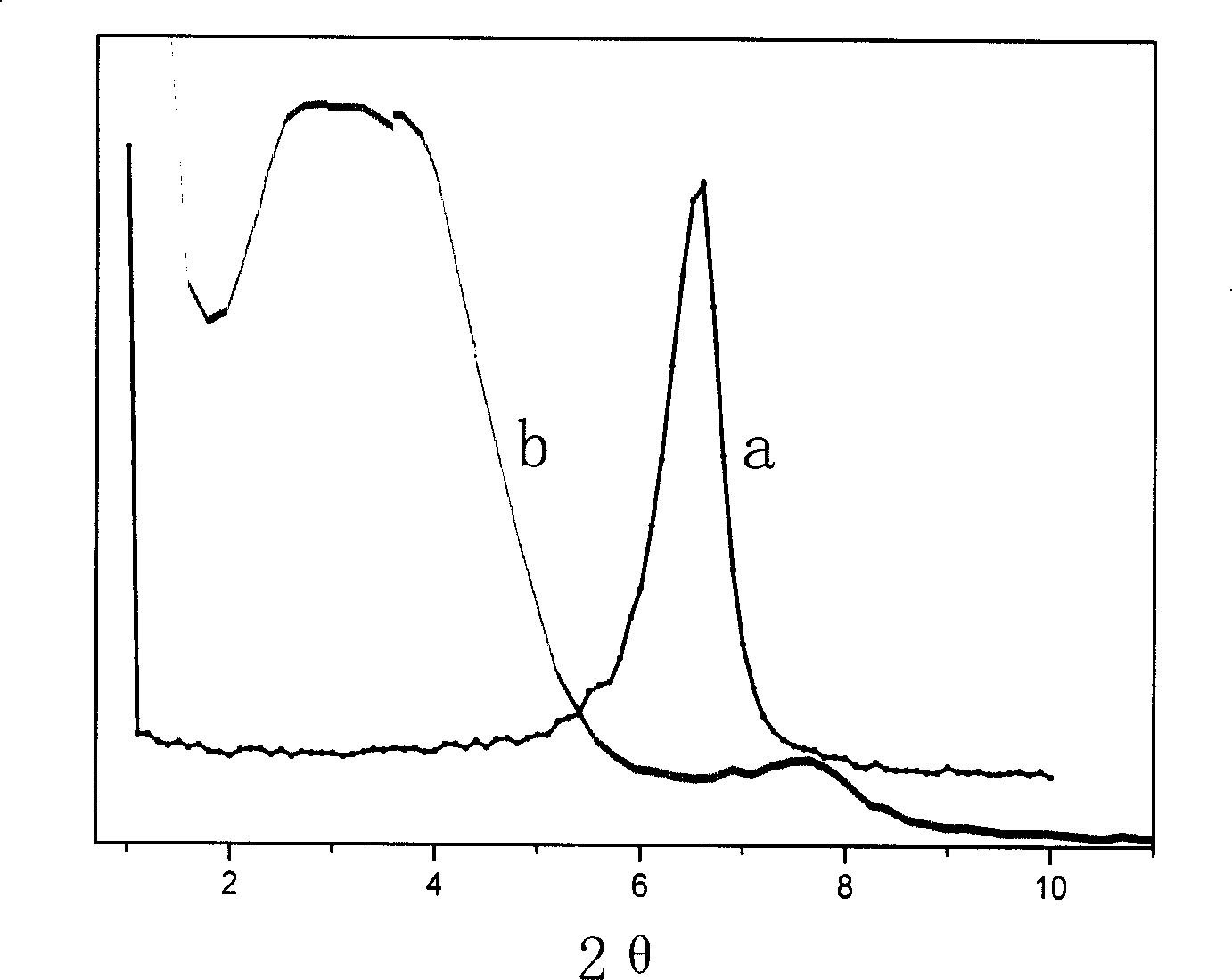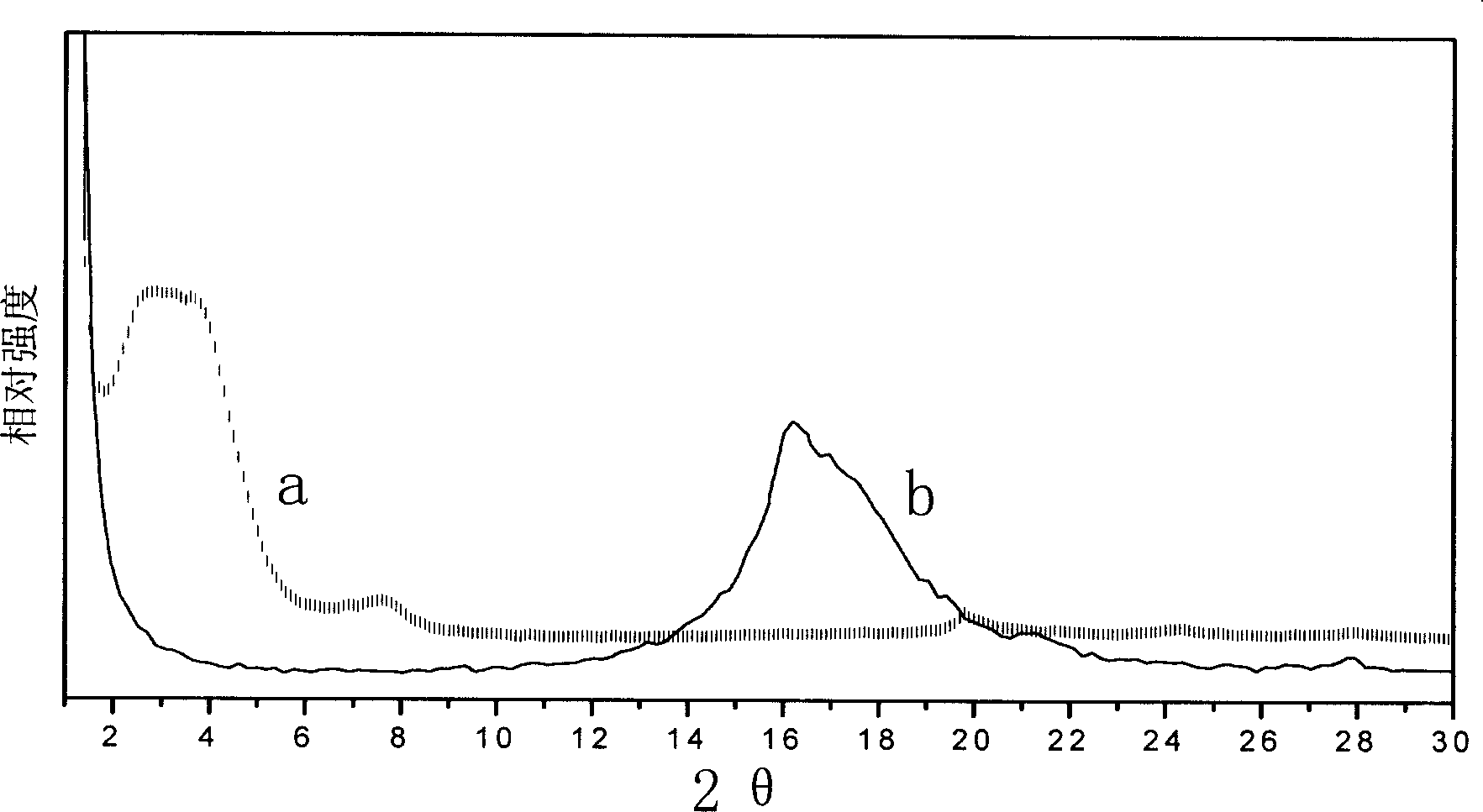Preparation of polydicyclopentadiene/montmorillonite nano composite material
A technology of nanocomposite material and polydicyclopentadiene, which is applied in the field of preparation technology of polydicyclopentadiene/montmorillonite nanocomposite materials, can solve problems such as polydicyclopentadiene that have not yet been seen, and achieve reduced production costs, Enhanced controllability and retarded polymerization speed
- Summary
- Abstract
- Description
- Claims
- Application Information
AI Technical Summary
Problems solved by technology
Method used
Image
Examples
Embodiment 1
[0031] 1. Preparation of tungsten-based catalyst
[0032] Add 6g of p-tert-butylphenol into a 250ml round bottom flask, vacuumize, fill with nitrogen to remove air and water vapor, transfer 2g of WCl 6 In the flask, inject 50ml of anhydrous toluene with a syringe, and reflux at 70°C for 18 hours to obtain a tungsten-based catalyst.
[0033] 2. Preparation of montmorillonite supported catalyst
[0034] Take 2g16 Put the organic montmorillonite into a 250ml round-bottomed flask, add 25ml of toluene as a solvent, then inject 2ml of the tungsten-based catalyst prepared above, and stir vigorously for 15 hours to obtain the montmorillonite-supported catalyst.
[0035] 3. Preparation of polydicyclopentadiene / montmorillonite nanocomposites
[0036] (1) Under the protection of argon, add 8 ml of the above-mentioned montmorillonite-supported catalyst and 20 ml of DCPD (99%) into the bottle, and stir evenly to obtain liquid A.
[0037] (2) Under the protection of argon, add 20ml of ...
Embodiment 2
[0041] 1. Preparation of tungsten-based catalyst
[0042] Add 7g of p-tert-butylphenol into a 250ml round bottom flask, vacuumize, fill with nitrogen to remove air and water vapor, transfer 3g of WCl 6 In the flask, inject 50ml of anhydrous toluene with a syringe, and reflux at 70°C for 20 hours to obtain a tungsten-based catalyst.
[0043] 2. Preparation of montmorillonite supported catalyst
[0044] Take 3g16 Put the organic montmorillonite into a 250ml round-bottomed flask, add 50ml of toluene as a solvent, then inject 4ml of the tungsten-based catalyst prepared above, and stir vigorously for 15 hours to obtain the montmorillonite-supported catalyst.
[0045] 3. Preparation of polydicyclopentadiene / montmorillonite nanocomposites
[0046] (1) Under the protection of argon, add 9ml of montmorillonite-supported catalyst and 25ml of DCPD (99%) into the bottle together, and stir evenly to obtain liquid A.
[0047] (2) Under the protection of argon, add 25ml of DCPD, 4ml of tr...
Embodiment 3
[0051] 1. Preparation of tungsten-based catalyst
[0052] Add 8 g of p-tert-butylphenol into a 250 ml round bottom flask, vacuumize, fill with nitrogen to remove air and water vapor, and transfer 3 g of WCl 6 In the flask, inject 50ml of anhydrous toluene with a syringe, and reflux at 70°C for 20 hours to obtain a tungsten-based catalyst.
[0053] 2. Preparation of montmorillonite supported catalyst
[0054] Take 3g16 Put the organic montmorillonite into a 250ml round-bottomed flask, add 50ml of toluene as a solvent, then inject 6ml of the tungsten-based catalyst prepared above, and stir vigorously for 15 hours to obtain the montmorillonite-supported catalyst.
[0055] 3. Preparation of polydicyclopentadiene / montmorillonite nanocomposites
[0056] (1) Under the protection of nitrogen, add 10 ml of montmorillonite-supported catalyst and 25 ml of DCPD (99%) into the bottle together, and stir evenly to obtain liquid A.
[0057] (2) Under the protection of nitrogen, add 25ml ...
PUM
 Login to View More
Login to View More Abstract
Description
Claims
Application Information
 Login to View More
Login to View More - R&D
- Intellectual Property
- Life Sciences
- Materials
- Tech Scout
- Unparalleled Data Quality
- Higher Quality Content
- 60% Fewer Hallucinations
Browse by: Latest US Patents, China's latest patents, Technical Efficacy Thesaurus, Application Domain, Technology Topic, Popular Technical Reports.
© 2025 PatSnap. All rights reserved.Legal|Privacy policy|Modern Slavery Act Transparency Statement|Sitemap|About US| Contact US: help@patsnap.com



